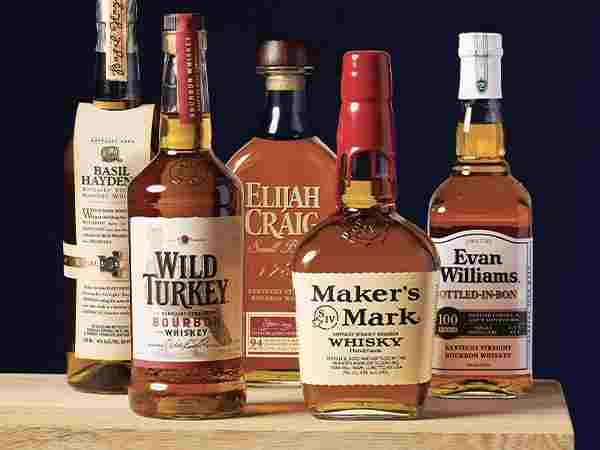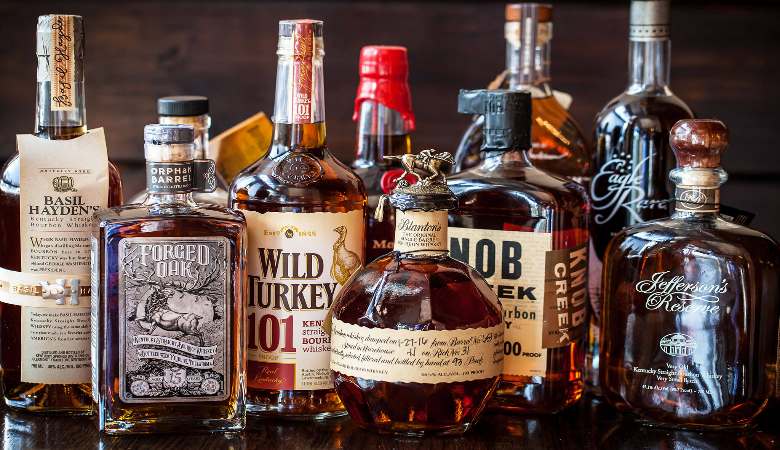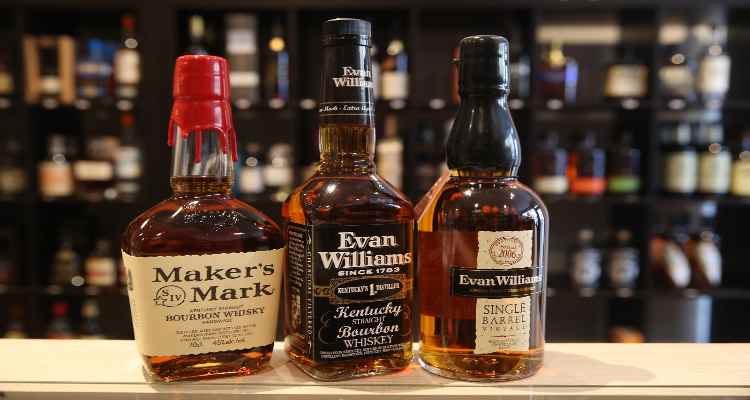Is Bourbon Whiskey Gluten-Free? & Best Gluten-Free Bourbon Brands

Bourbon and other whiskeys can be a source of confusion, particularly for those who follow a gluten-free diet. You may have asked yourself whether bourbon is gluten-free, and understandably so.
This article provides a comprehensive guide to bourbon, including a list of the top gluten-free brands.

What is Bourbon?
Bourbon is an American whiskey primarily produced in the southern region of Kentucky. It is defined by US Trade Legislation as a type of whiskey with a mashbill containing 51% to 80% corn, which refers to the recipe of grains used in its production. Generally, distillers use around 70% corn in their mashbill, with the remaining portion consisting of other grains of their choosing. The selection of grains used in the mashbill influences the style and flavor profile of the resulting whiskey.
Is Bourbon Whiskey Gluten-Free?
According to some experts, pure distilled bourbon and other alcoholic beverages made from gluten grains may be considered gluten-free and safe for consumption by individuals with celiac disease or non-celiac gluten sensitivity. The National Celiac Association confirms that the process of distillation removes the harmful gluten protein, making distilled alcohol generally considered gluten-free.
If you are following a gluten-free diet, it is permissible to consume bourbon as long as the variant you choose is distilled purely.
Distilling is a process that separates alcohol from other substances, such as water and gluten, in order to increase the concentration of alcohol. As a result, the gluten is actually removed from the alcohol, making some types of alcohol, like bourbon, gluten-free.
Because food and alcohol have different characteristics, the TTB (The Alcohol and Tobacco Tax and Trade Bureau) has issued a new ruling regarding gluten-free claims for alcohol products. Under this policy, alcohol manufacturers can make a gluten-free claim as long as they follow good manufacturing practices and take steps to prevent cross-contact with gluten-containing substances.
Can you drink bourbon whiskey on a gluten-free diet?
If you’re on a gluten free diet, you can still enjoy bourbon as long as you choose a brand that is gluten-free. It’s important to note that certain bourbons may have gluten-based ingredients reintroduced after the distillation process, which would make them unsuitable for those avoiding gluten.

5 Best Bourbon Whiskey Brands for Gluten-Free Diet
1) Four Roses Kentucky Straight Bourbon
This bourbon has received numerous awards and is a unique blend of 10 bourbon recipes, skillfully combined to create a gluten-free spirit that showcases the best flavors of each recipe. After being aged for five years, Four Roses bourbon is known for its smoothness and rich taste, featuring prominent notes of oak and herbs that leave a lasting impression. With an 80-proof alcohol content, this bourbon is enjoyable either on its own or as a flavorful addition to your favorite cocktails.
2) Wild Turkey
For over 60 years, Gluten-free Wild Turkey has been crafted in the same manner, resulting in a splendidly oaked bourbon that boasts hints of vanilla, caramel, and orange peel – ideal for savoring while sitting by a warm fire on chilly nights. This bourbon has been aged for six to eight years and is 101 proof.
3) Evan Williams Kentucky Straight Bourbon
Evan Williams Kentucky Straight Bourbon is a robust spirit, renowned for its lengthy aging process that results in a smooth, smoky and rich flavor. Its aroma carries hints of vanilla and mint, while its taste boasts a bold bourbon flavor complemented by subtle undertones of oak, brown sugar and caramel. With an alcohol content of 86 proof, Evan Williams is the perfect drink to indulge in on a cold winter evening.
4) Maker’s Mark
Maker’s Mark, a bourbon with a distillery in Kentucky, distinguishes itself from other bourbons by using soft red winter wheat instead of rye. Each barrel of Maker’s Mark is meticulously rotated by hand and aged for six to seven years, resulting in a creamy and smooth flavor profile with notes of sweet oak, florals, and vanilla. Although Maker’s Mark uses gluten-containing mash in its production process, the distillation process effectively removes the gluten.
5) Knob Creek
Knob Creek, a gluten-free bourbon, is worth the nine-year wait as it gains character and smoothness from aging in oak. With a pre-Prohibition taste, this top-shelf choice has a bold oak flavor complemented by notes of vanilla and rich caramel. Its 100-proof kick adds to its appeal.
Conclusion
Bourbon that is pure and distilled, even if it includes wheat, barley, or rye in the initial mix, is generally regarded as gluten-free. This is because the distillation process removes most, if not all, of the gluten from the final product. Nevertheless, it’s important to be vigilant about possible sources of hidden gluten in bourbons that contain additional flavorings or additives after distillation. Additionally, cross-contamination with gluten is a risk in facilities that handle wheat, barley, or rye products, so it’s wise to be aware of that potential issue as well.
Source of information ;
Celiac Disease Foundation. Gluten-free foods.Beyond Celiac.
Is bourbon gluten-free?.National Celiac Association.





Would you please expand upon the gluten-based ingredients that might be reintroduced after the distillation process?
Yeah of course
The distillation process is believed to remove gluten from the final product. This is because gluten is a large molecule that does not vaporize easily, so it is left behind in the still during the distillation process. As a result, many distilled alcoholic beverages are considered to be gluten-free and safe for people with celiac disease or gluten intolerance to consume.
However, there are some gluten-based ingredients that may be added back into the final product after the distillation process. For example, some manufacturers may add flavorings or colorings to the distilled spirit that contain gluten. Additionally, some distilled spirits may be aged in barrels that have previously been used to age other alcoholic beverages that contain gluten. In these cases, there is a risk that gluten residues from these ingredients could be present in the final product.
If this is confusing to you, the following excerpt from The Gluten-Free Nutrition Guide (Tricia Thompson, McGraw-Hill, 2008) may help:
“Alcoholic beverages are either fermented or distilled. Fermented and distilled beverages are made by first converting starch or sugar from a food source (for example, grapes, wheat, or potato) to alcohol, using yeast. With fermented beverages, such as beer, the liquid removed from the mash (the mixture of starting materials) is boiled. If a gluten-containing grain is one of the food sources used to make the mash, the liquid removed from the mash is not gluten-free. With distilled beverages, such as vodka, the liquid removed from the mash is not only boiled but also distilled. Distillation is used to increase the alcohol content of the beverage. When the liquid is boiled, the vapor is “captured” and cooled. The resulting liquid is called the distillate. Distillation separates substances that are volatile (meaning they vaporize) from less volatile substances. Protein is not volatile and does not vaporize. Consequently, even if wheat, barley, or rye was used to make a distilled alcoholic beverage, gluten-containing proteins will not be found in the final distillate.”
Thank you for comment